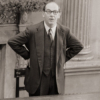Isaiah Berlin

Isaiah Berlin
Sir Isaiah Berlin OM CBE FBAwas a Russian-British social and political theorist, philosopher and historian of ideas. He was an essayist, conversationalist, raconteur, and lecturer. In its obituary of the scholar, the Independent stated that "Isaiah Berlin was often described, especially in his old age, by means of superlatives: the world's greatest talker, the century's most inspired reader, one of the finest minds of our time... there is no doubt that he showed in more than one direction the unexpectedly...
NationalityRussian
ProfessionPhilosopher
Date of Birth6 June 1909
CountryRussian Federation
There exists a great chasm between those, on one side, who relate everything to a single central vision... and, on the other side, those who pursue many ends, often unrelated and even contradictory... The first kind of intellectual and artistic personality belongs to the hedgehogs, the second to the foxes.
The simple point which I am concerned to make is that where ultimate values are irreconcilable, clear-cut solutions cannot, in principle, be found. To decide rationally in such situations is to decide in the light of general ideals, the overall pattern of life pursued by a man or a group or a society.
Churchill for all his love of the present hour, his unquenchable appetite for new knowledge, his sense of the technological possibilities of our time, and the restless roaming of his fancy in considering how they might be most imaginatively applied, despite his enthusiasm for Basic English, or the siren suit which so upset his hosts in Moscow - despite all this, Churchill remains a European of the nineteenth century.
One must look at what impiety hates, what puts it in a rage, what it attacks always, everywhere, and with fury - that will be the truth.
The desire not to be impinged upon, to be left to oneself, has been the markof high civilisation both on the part of individuals and communities.
When one is engaged in a desperate defense of one's world and its values, nothing can be given away, any breach in the walls might be fatal, every point must be defended to the death.
We are doomed to choose and every choice may entail irreparable loss.
No perfect solution is, not merely in practice, but in principle, possible in human affairs, and any determined attempt to produce it is likely to lead to suffering, disillusionment and failure.
The underlying assumption that human nature is basically the same at all times, everywhere, and obeys eternal laws beyond human control, is a conception that only a handful of bold thinkers have dared to question.
Liberty is liberty, not equality or fairness or justice or human happiness or a quiet conscience.
Liberty for wolves is death to the lambs.
Conformities are called for much more eagerly today than yesterday... skeptics, liberals, individuals with a taste for private life and their own inner standards of behavior, are objects of fear and derision and targets of persecution for either side... in the great ideological wars of our time.
The trouble with academics and commentators is that they care more about whether ideas are interesting than whether they are true.
I wish my life and decisions to depend upon myself, not on external forces of whatever kind. I wish to be the instrument of my own, not other men's, acts of will. I wish to be the subject, not an object...I wish to be somebody, not nobody; a doer - deciding, not being decided for, slef-directed and not acted upon by external nature or by other men as if I were a thing, or an animal, or a slave incapable of playing a human role, that is, of conceiving goals and policies of my own and realizing them.